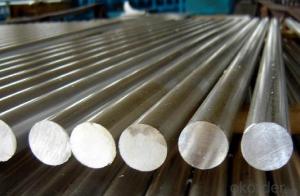JIS SCM440 DIN 42CrMo4 1.7225 Hot rolled AISI 4140 Round Bars Alloy Steel
- Loading Port:
- Shanghai
- Payment Terms:
- TT OR LC
- Min Order Qty:
- 3 m.t.
- Supply Capability:
- 100000 m.t./month
OKorder Service Pledge
OKorder Financial Service
You Might Also Like
Item specifice
JIS SCM440 DIN 42CrMo4 1.7225 Hot rolled AISI 4140 Round Bars Alloy Steel
Details Information of JIS SCM440 DIN 42CrMo4 1.7225 Hot rolled AISI 4140 Round Bars Alloy Steel
| Name | SAE1045 Carbon Steel Round Bar |
| Shape | Round Bar/Square Bar/Flat Bar/Plate/Wire |
| Standard | GB/ASTM/SAE/AISI/DIN/JIS/EN/BS |
| Surface Treatment: | Black/Peeling/Polished/Machined |
| Delivery Condition: | Hot Rolled or Forged/Peeled or Black Surface |
| Test | SGS/UT 100% Elements Testing |
| Certificate: | ISO/Mill Certificate |
| Service: | 24 hours online service / |
| more than 20 years trading and manufacture | |
| Quality Assurance: | the third party inspection, such as SGS, BV, TUV…etc. is acceptable |
| Packaging Details: | Seaworthy Packaging or as per customer's packing instruction |
| Carbon structure round bar | Q195 Q235A Q235B 10# 20#-55# S45CB |
| Low alloy high strength round bar | Q345A/Q345C/Q345D Q345B Q345E |
| Alloy structure round bar | SAE51B20 20Cr 40Cr 40CrV 20CrMo/30CrMo/35CrMo/42CrMo 20CrMoA/30CrMoA/35CrMoA/42CrMoA/42Cr ML20CrMo/ML30CrMo/ML35CrMo/ML42CrMo B7/SCM435-440 20MnTiB 20CrMnMo 20CrMoH 42CrMoH 40MnB/40MnBH 30Mn2-40Mn2 27SiMn 50CrVA 30CrMnTi |
| Pinion steel | 20CrMnTi 20CrMnTiH 20CrMnTiHCS/20CrMnTiHLD Q20CrMnTi-1/Q20CrMnTi-2 |
| Sucker rod | 20-35CrMoA |
| Free-cutting steel | GT1215S |
| Spring steel | 60Si2MnA 65Mn |
| Ball bearing steel | GCr15 |
Chemical Composition of JIS SCM440 DIN 42CrMo4 1.7225 Hot rolled AISI 4140 Round Bars Alloy Steel
| C | Si | Mn | P | S | Cr | Ni | Cu |
| 0.17-0.24 | 0.17-0.37 | 0.35-0.65 | ≤0.035 | ≤0.035 | ≤0.25 | ≤0.25 | ≤0.25 |
| Tensile strength (σb/MPa) | Yield strength (σb/MPa) | Elongation (δ5/%) |
| ≥410(42) | ≥245(25) | ≥25 |
Company Introduction of JIS SCM440 DIN 42CrMo4 1.7225 Hot rolled AISI 4140 Round Bars Alloy Steel
CNBM International Corporation is the most import and export platform of CNBM group(China National Building Material Group Corporation) ,which is a state-owned enterprise, ranked in 270th of Fortune Global 500 in 2015.
With its advantages, CNBM International are mainly concentrate on Cement, Glass, Iron and Steel, Ceramics industries and devotes herself for supplying high quality series of refractories as well as technical consultancies and logistics solution.
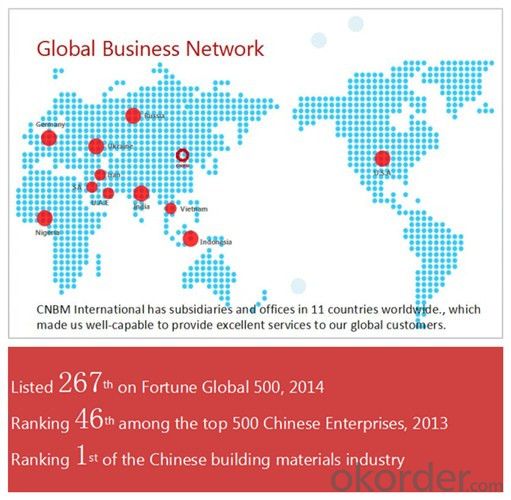
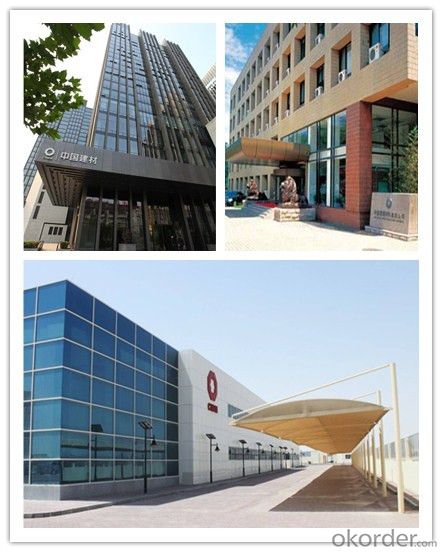
Certificates of JIS SCM440 DIN 42CrMo4 1.7225 Hot rolled AISI 4140 Round Bars Alloy Steel
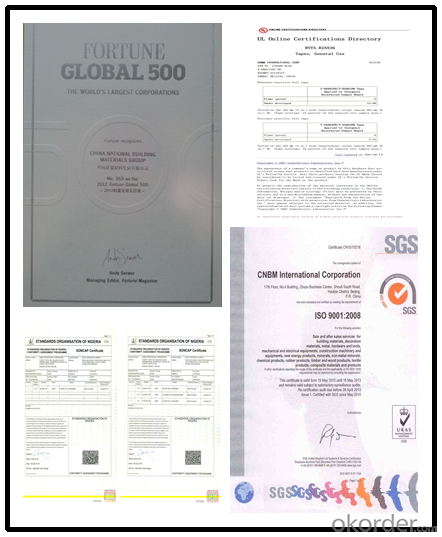
Packaging & Delivery of JIS SCM440 DIN 42CrMo4 1.7225 Hot rolled AISI 4140 Round Bars Alloy Steel
Packaging Detail | Sea worthy packing /as per customer's packing instruction |
Delivery Detail | 15 ~ 40 days after receiving the deposit |
Products show of JIS SCM440 DIN 42CrMo4 1.7225 Hot rolled AISI 4140 Round Bars Alloy Steel
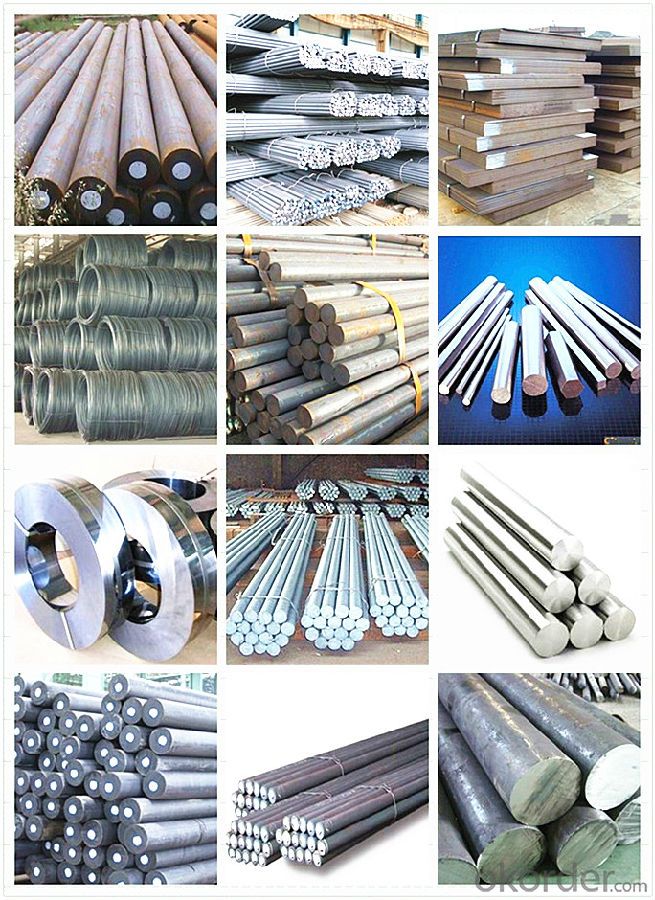
FAQ
Are you a trading company or manufacturer? | Manufacturer |
What’s the MOQ? | 3 metric ton |
What’s your delivery time? | 15-35 days after downpayment received |
Do you Accept OEM service? | Yes |
what’s your delivery terms? | FOB/CFR/CIF |
What's the Payment Terms? | 30% as deposit,70% before shipment by T/T |
Western Union acceptable for small amount. | |
L/C acceptable for large amount. | |
Scrow ,Paybal,Alipay are also ok | |
Why choose us? | Chose happens because of quality, then price, We can give you both. Additionally, we can also offer professional products inquiry, products knowledge train (for agents), smooth goods delivery, excellent customer solution proposals. |
What's your available port of Shipment? | Main Port, China |
What’s your featured services? | Our service formula: good quality+ good price+ good service=customer's trust
|
Where are your Market? | Covering more than 160 countries in the world |
- Q:What are the specific requirements for special steel used in the oil and gas pipeline industry?
- The specific requirements for special steel used in the oil and gas pipeline industry are dictated by the harsh operating conditions and the need for high performance and reliability. Some of the key requirements include: 1. Corrosion resistance: Special steel used in the oil and gas pipeline industry must possess excellent resistance to corrosion, as pipelines are exposed to various corrosive elements such as moisture, gases, and chemicals. This helps to prevent the degradation or failure of the pipeline due to corrosion. 2. High strength: The steel used in pipelines must have high tensile strength to withstand the high pressure and stress that it experiences during transportation of oil and gas. This ensures the pipeline's structural integrity and prevents leaks or bursts. 3. Toughness and impact resistance: The steel must be able to absorb energy and resist fracture when subjected to sudden impact or external forces. This is crucial for maintaining pipeline integrity and preventing accidents or ruptures. 4. Low temperature toughness: As pipelines often operate in cold environments, the steel must exhibit excellent low-temperature toughness to prevent brittle fracture. This ensures that the pipeline remains ductile and resistant to failure even at extremely low temperatures. 5. Weldability: Special steel used in pipelines should be easily weldable to facilitate the construction and repair of pipelines. Good weldability ensures strong and reliable joints that can withstand the stress and pressure during operation. 6. Resistance to hydrogen-induced cracking: Steel used in the oil and gas pipeline industry should have high resistance to hydrogen-induced cracking (HIC) and sulfide stress cracking (SSC). These types of cracks can occur when hydrogen or sulfide ions penetrate the steel, leading to catastrophic failure. Resistance to these types of cracking is crucial for pipeline safety. 7. Compliance with industry standards: Special steel used in the oil and gas pipeline industry must meet specific industry standards and regulations. These standards ensure that the steel meets the required mechanical properties, chemical composition, and manufacturing processes necessary for safe and reliable pipeline operation. Overall, the specific requirements for special steel used in the oil and gas pipeline industry are aimed at ensuring corrosion resistance, high strength, toughness, low-temperature performance, weldability, resistance to cracking, and compliance with industry standards. These requirements are essential for maintaining the integrity and safety of oil and gas pipelines.
- Q:How is maraging steel used in the production of rocket and missile components?
- Maraging steel is used in the production of rocket and missile components due to its exceptional strength, toughness, and resistance to heat and corrosion. Its unique properties make it ideal for critical parts like rocket casings, engine components, and missile guidance systems, where high performance and reliability are paramount. The steel's ability to handle extreme conditions, such as high pressures and temperatures, ensures that these components can withstand the rigorous demands of aerospace applications.
- Q:What are the applications of special steel in the medical field?
- Special steel has various applications in the medical field due to its unique properties and characteristics. One of the primary applications of special steel in the medical field is in the manufacturing of surgical instruments. Special steel, such as stainless steel, is widely used to produce sharp, durable, and corrosion-resistant surgical instruments like scalpels, forceps, scissors, and surgical needles. These instruments need to be strong enough to withstand repeated use and sterilization without losing their sharpness or integrity, and special steel provides the necessary strength and durability. Another important application of special steel in the medical field is in the production of implants and prosthetics. Special steel alloys, including titanium alloys, cobalt-chromium alloys, and nickel-titanium alloys, are commonly used to manufacture orthopedic implants, dental implants, and various other medical devices. These alloys offer excellent biocompatibility, corrosion resistance, and mechanical strength, making them ideal for long-term implantation in the human body. Additionally, special steel is used in the construction of medical equipment and machinery. Diagnostic machines like MRI scanners and X-ray machines often utilize special steel components due to their magnetic properties and ability to withstand high temperatures. The use of special steel in medical equipment ensures the accuracy, reliability, and safety of these devices. Furthermore, special steel is employed in the manufacturing of medical storage and transportation systems. Steel cabinets, trolleys, and containers are commonly used to store and transport medical supplies, instruments, and samples. Special steel ensures the durability and hygiene of these storage systems, as it is easy to clean, resistant to contamination, and has a long lifespan. In conclusion, the applications of special steel in the medical field are extensive and diverse. From surgical instruments to implants, medical equipment to storage systems, special steel plays a vital role in ensuring the effectiveness, reliability, and safety of medical procedures and treatments. Its unique properties make it an indispensable material in the healthcare industry.
- Q:What are the properties of high-temperature alloy steel?
- High-temperature alloy steel possesses several key properties that make it suitable for use in high-temperature environments. These properties include excellent strength and toughness, good resistance to oxidation and corrosion, high creep resistance (ability to withstand gradual deformation under stress at elevated temperatures), and thermal stability. Additionally, high-temperature alloy steel often exhibits good thermal conductivity and low thermal expansion, allowing it to maintain its shape and mechanical properties even at extreme temperatures.
- Q:What is the impact strength of special steel?
- The impact strength of special steel can vary depending on its composition and specific grade. However, special steel is generally known for its high impact strength, making it highly resistant to sudden shocks, impacts, and fractures.
- Q:What are the applications of special steel in the nuclear industry?
- Special steel is extensively used in the nuclear industry due to its unique properties. It is used to manufacture various components such as reactor vessels, steam generators, and fuel cladding, which require high strength, corrosion resistance, and heat resistance. Special steel ensures the safety and efficiency of nuclear power plants by withstanding extreme temperatures, pressures, and corrosive environments. Its applications in the nuclear industry are crucial for maintaining the integrity and reliability of nuclear facilities.
- Q:Can special steel be used in the oil and gas equipment manufacturing industry?
- Yes, special steel can be used in the oil and gas equipment manufacturing industry. Special steel, such as stainless steel or alloy steel, offers high strength, corrosion resistance, and durability, making it suitable for various applications in the oil and gas sector. It is commonly used in the manufacturing of pipes, valves, fittings, and other critical components that can withstand harsh operating conditions and prevent leakage or failure.
- Q:How does special steel contribute to the corrosion resistance of products?
- Special steel contributes to the corrosion resistance of products by incorporating specific alloying elements that enhance its ability to withstand the effects of corrosion. These alloying elements, such as chromium and nickel, form a protective layer on the surface of the steel, known as a passive film. This passive film acts as a barrier, preventing oxygen and moisture from reaching the underlying metal, thus reducing the likelihood of corrosion. The high levels of chromium in special steel, for example, enable the formation of a dense and stable chromium oxide layer on the surface. This layer acts as a physical barrier, preventing the diffusion of corrosive agents and inhibiting the formation of rust. Additionally, the presence of nickel in the alloy further enhances the corrosion resistance of the steel by promoting the formation of a more uniform and adherent passive film. Moreover, special steel can be specially treated or processed to enhance its corrosion resistance. Techniques such as heat treatment and surface coating can modify the structure and composition of the steel, promoting the formation of more stable passive films and reducing the susceptibility to corrosion. These treatments also help to improve the mechanical properties of the steel, making it more durable and resistant to external factors that may lead to corrosion. In summary, the use of special steel in various products contributes to their corrosion resistance by incorporating alloying elements and employing specific treatments that promote the formation of protective passive films. This, in turn, prolongs the lifespan of the products and ensures their performance and integrity, even in harsh and corrosive environments.
- Q:Can special steel be used in the automotive industry?
- Yes, special steel is commonly used in the automotive industry for various applications such as engine components, chassis parts, and suspension systems. Its high strength, durability, and resistance to corrosion make it ideal for improving safety, performance, and overall quality of automobiles.
- Q:What are the different surface defects in special steel?
- There are several different surface defects that can occur in special steel. Some of the common defects include: 1. Scale: Scale is a thin layer of oxide that forms on the surface of steel during the manufacturing process. It can appear as a flaky or powdery substance and can be caused by exposure to high temperatures or improper cooling. Scale can affect the appearance and quality of the steel surface. 2. Pitting: Pitting is the formation of small, localized holes or depressions on the surface of the steel. It can be caused by corrosion, improper cleaning or surface preparation, or exposure to harsh environments. Pitting can weaken the steel and make it more susceptible to further corrosion. 3. Scratches: Scratches are physical marks or indentations on the surface of the steel. They can occur during handling, transportation, or processing of the steel. Scratches can affect the appearance and integrity of the steel surface and may need to be repaired or removed. 4. Roll marks: Roll marks are impressions or patterns left on the steel surface during the rolling process. They can appear as lines, grooves, or ridges and can be caused by uneven pressure or improper alignment of the rolling equipment. Roll marks can affect the surface smoothness and may require additional processing or polishing to remove. 5. Inclusions: Inclusions are foreign particles or substances that are embedded within the steel. They can be caused by impurities in the raw materials or contamination during the manufacturing process. Inclusions can weaken the steel and may lead to cracks or fractures. 6. Decarburization: Decarburization is the loss of carbon from the surface layer of the steel. It can occur during heating or annealing processes, and it can result in reduced hardness and strength of the steel surface. Decarburization is usually undesirable in special steel as it affects its performance. These are just some of the surface defects that can occur in special steel. It is important to identify and address these defects to ensure the quality and performance of the steel product.
1. Manufacturer Overview |
|
|---|---|
| Location | |
| Year Established | |
| Annual Output Value | |
| Main Markets | |
| Company Certifications | |
2. Manufacturer Certificates |
|
|---|---|
| a) Certification Name | |
| Range | |
| Reference | |
| Validity Period | |
3. Manufacturer Capability |
|
|---|---|
| a)Trade Capacity | |
| Nearest Port | |
| Export Percentage | |
| No.of Employees in Trade Department | |
| Language Spoken: | |
| b)Factory Information | |
| Factory Size: | |
| No. of Production Lines | |
| Contract Manufacturing | |
| Product Price Range | |
Send your message to us
JIS SCM440 DIN 42CrMo4 1.7225 Hot rolled AISI 4140 Round Bars Alloy Steel
- Loading Port:
- Shanghai
- Payment Terms:
- TT OR LC
- Min Order Qty:
- 3 m.t.
- Supply Capability:
- 100000 m.t./month
OKorder Service Pledge
OKorder Financial Service
Similar products
New products
Hot products
Related keywords
